School District Opts Out Of Free Lunch Program So Kids Don't 'Become Spoiled'

A school board member cited concerns that kids would “become spoiled” if the district continued to be part of a federally funded program that gives free lunch to all students
In today’s dispatch from our bleak dystopia, a school district has opted out of a federally funded program that provides all students with free lunch regardless of their family’s income status. One school board member’s stated reason for being the only eligible school district in the state to decline the program? Kids might “become spoiled” by free lunches.
Yes, seriously.
According to The Washington Post, the Waukesha School District board voted in June to return to pre-COVID times and be part of the National School Lunch Program, which only offers free and reduced-price meals to eligible students and their families who apply for the service and receive federal money for it. They opted out of the U.S. Department of Agriculture’s Food and Nutrition Service’s extension of the Seamless Summer Option, a program that provides free meals to all students through June 30, 2022.
District parent Dave Dringenburg’s kids never qualified for the program pre-pandemic but said the district’s decision upset him nevertheless, saying school officials “seem to be out of touch with the community’s needs.” Dringenburg felt that the district continuing with the federal program that feeds all kids for free was a chance to make their city a better place to live for everyone. “We’re determined to make Waukesha as good as it can be, starting with something as easy as feeding kids,” he said. “This is a way to not only connect to other parents but also of realizing that change is possible — it’s just a matter of being together to do it.”
Joseph Como Jr., president of the school board, said at their June meeting that taking away the free program was simply part of returning to pre-COVID life (apparently ignoring the fact that cases are skyrocketing just about everywhere). “As we get back to whatever you want to believe normal means, we have decisions to make,” Como told the Board. “I would say this is part of normalization.”
Why would we want to normalize not making sure every single kid in the building is fed? We are getting close to the two-year mark of this crisis and I would like to think that maybe not everything has to return to “normal.” Who says “normal” is good? Can’t we learn something from this horror show? Such as, feeding kids isn’t a bad thing? For those who truly need it financially it’s life-saving. For others, it’s simply one less thing for parents to worry about. It also equalizes things with all of the children, which can reduce any stigma of only some kids receiving free or reduced price lunches. Of all things a school could pay for, I think food for every student should be at the top of the list but apparently, some people think feeding kids equals…. spoiling them?
Board member Karin Rajnicek said the free lunch program made it easy for families to “become spoiled” while assistant superintendent for business services Darren Clark cited his concern that continuing with the free program might initiate a “slow addiction” to the service.
Addiction? Addiction to being fed? Addicted to making sure kids are being fed at school? I want off this nightmare timeline right now where there are actual breathing humans who think we’re spoiling children by feeding them at no cost. I am truly afraid for the human race if there are people concerned that kids might get addicted to EATING LUNCH EVERY DAY.
Needless to say, I’m not the only one left furious by the Board’s sentiment.
Ioana Marinescu, an economist at the University of Pennsylvania’s School of Social Policy and Practice, says that if anything, the universal free program means there’s no incentive to rely on the lunch programs. “If anything, it’s the opposite effect,” she said. “The one that’s based on conditions because it’s required to have low income might create the disincentives the board is talking about, but the universal one is less likely to create disincentives.”
Marinescu says the benefits of the universal free program extend beyond helping families who qualify by their income status — it can also help families who don’t qualify financially but could still use some help, and the families that might not want to apply for the free lunch program due to the stigma.
Como says the Board will hold a special meeting for “discussion and possible action on the National School Lunch Program and Seamless Summer Option” on Monday. Let’s hope they realize that feeding children doesn’t equal “spoiling” them so I can go back to believing that most people aren’t evil sludge. I think we could all use that reminder.